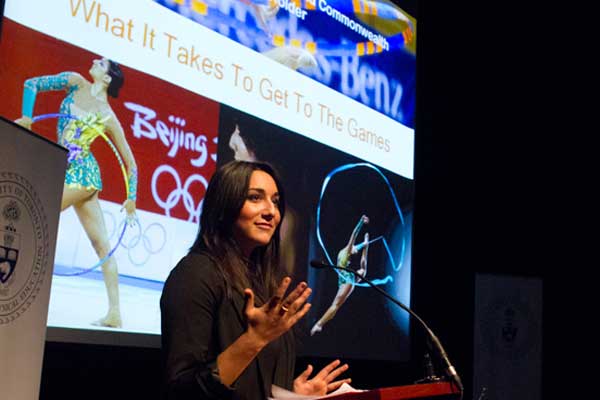
What does it take to make it to the Olympics?
Published: April 8, 2012
Olympian Alexandre Bilodeau stood at the top of the moguls course at the Vancouver Olympics, confronted by a sea of rowdy Canadians, glaring lights and hundreds of cameras. Professor Greg Wells, a CTV commentator during the Games, watched Bilodeau focus his eyes and whisper three words: “forward and soft” – a ‘note to self’ to focus forward down the hill and soft in the air.
According to Wells, it was that simple, nerve-settling mantra that took Bilodeau to the top of the podium, making him Canada’s first gold medalist on home turf.
Wells shared that anecdote April 4 to a crowd of more than 300 at the Faculty of Kinesiology and Physical Education’s third public symposium, “The Olympic Athlete: What it Takes to Get to The Games.”
A renowned physiologist with expertise in the finest points of sport science, Wells emphasized that beyond physical prowess, high performance athletes need mental strength and go-to techniques such as “three deep breaths” to deal with the enormous pressure of competing on the world stage.
That emphasis on holistic development was echoed by Wells’s fellow speakers of the evening: Professor Gretchen Kerr, track and field coach Carl Georgevski and Olympian Alexandra Orlando.
“Coaching is not about the event itself,” Georgevski told the crowd. “A coach doesn’t coach an event. A coach coaches people.”
Having mentored several Olympians and now at the helm of the Blues track and field team, Georgevski shared examples from his early days when he focused too heavily on physical endurance and learned the hard way that rest, mental preparedness and listening to athletes are equally key to fostering a champion.
Kerr, an expert in sports psychology and a former elite gymnast and coach herself, called for developing the whole person and creating better collaborations between coaches, nutritionists and sport psychology consultants.
Orlando agreed, insisting that this kind of holistic preparation proved essential for her leading up to, and at, the 2008 Games. The world-class rhythmic gymnast who graduated from U of T's Woodsworth College in 2010 with a BA in political science, opened her presentation with footage of her routine in Beijing. Her athleticism and grace made it easy to miss that both ankles were heavily taped to support three torn ligaments in her left ankle and a serious sprain in her right.
“With every movement, pain jetted from my feet, up my legs, to the pit of my stomach, but pain is pain and it was the Olympics,” Orlando said. Echoing Kerr’s philosophy, Orlando explained that while her passion and talent for sport helped her get to Beijing, it was her personal development leading up to 2008 – learning to accept failure, manage stress and self-doubt, and see herself as more than just a high performance athlete – that helped her join Team Canada.
“Who I wanted to be was not just Alex the gymnast," Orlando said. "I wanted to be Alex the person.”
The symposium wrapped up with a panel discussion moderated by award-winning CBC sports journalist Teddy Katz. Members of the audience – from athletes and coaches to parents and educators – posed a variety of questions to the experts, including one to Orlando about tips for parents of aspiring Olympians.
“Don’t try to be their coach,” Orlando advised. “And make home a safe place of support.”
Read coverage of the symposium in the Toronto Star here.



